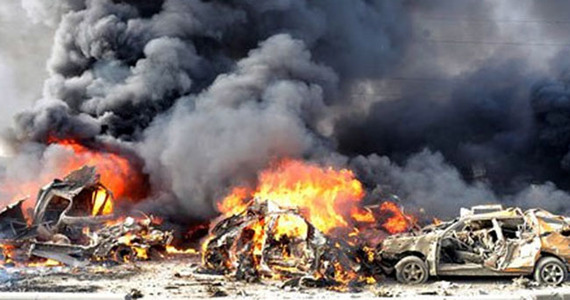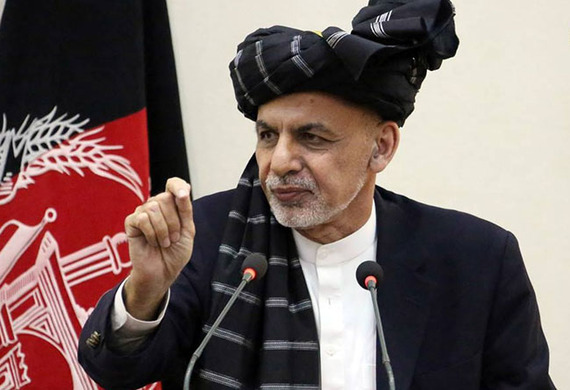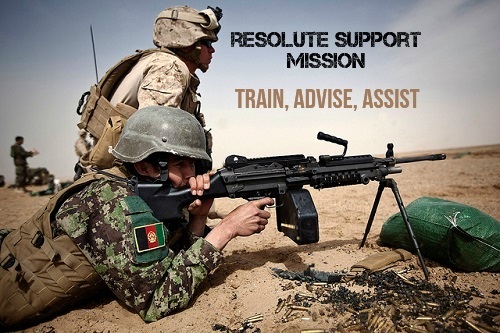April 19 Big Bang (Photo: Afghanoutlook.net)
On Tuesday April 19th, a powerful Vehicle Born Improvised Explosive Device hit the headquarters of an Afghan security forces unit. This directorate is responsible for the security of high ranking Afghan officials and dignitaries. The explosive laden truck breached the wall of the compound, making it accessible for three assailants seconds later. Once inside they killed many more who were not hit by the initial explosion. Afghan security forces killed the attackers in the ensuing battle. The Taliban claimed responsibility for the carnage, which left 64 people dead and over 300 wounded. Civilians, women and children were among the casualties. This spectacular attack hitting the capital, Kabul, was the deadliest since 2011. This year's Taliban spring offensive (dubbed Operation Omari) began with a deadly bang!
Caught in between are the defenseless unsuspecting civilians whose casualty numbers keep climbing. This increase is a function of an ever increasing resurgent insurgency and the weakness of the Afghan security forces. The United Nation's Mission in Afghanistan recently issued a sobering report on the toll that insecurity has taken on civilians. The report indicates that between January 1 and March 31 of this year 600 civilians died while 1343 persons were injured.
Afghan President Ashraf Ghani Warning the Taliban (Photo: Afghanoutlook.net)
Following the attack, Afghan President Ashraf Ghani issued statements calling the attack inhumane and stating that the Afghan government will avenge every drop of the victims' blood. He implicitly accused the Taliban as agents of a foreign power, meaning Pakistan. CEO Abdullah Abdullah canceled a visit to Pakistan scheduled for May 2nd. To many Afghans these are empty words and actions which the National Unity Government (NUG) issues following attacks and other setbacks. There is no follow through because of the inability and incompetence of the NUG. Confidence in the NUG continues to decline as the Taliban carry out more brazen attacks. The Taliban recently rejected the idea of peace negotiations, and this attack makes the prospects of sitting around the table even more remote anytime soon.
In exasperation, Kabulis also lashed out at the US and other countries for not pressuring Pakistan to reign in their proxies: the Taliban and their affiliated terror allies such as the Haqqani Group. It is believed that this latest attack was the handiwork of the latter group, capable of carrying out complex bombings. Although one can appreciate the frustration of Afghans who have lived in constant conflict since 1978, the US is not able to end the Afghan civil war.
The refrain that the US is capable of stopping the conflict in Afghanistan if it wants to is nothing new. During my deployments as a US diplomat, Afghans would tell me that you (the US) are fighting the Taliban in Afghanistan, but also helping them by giving military and other aid to Pakistan. The problem is that most insurgencies and civil wars are complex affairs. They are complex due to support from other countries for their proxies, regional geopolitical interests, internal animosity stemming from tribal and ethnic divisions, self-serving warlords, and so on. These conflicts usually last for around 10 years, with the 40-year Afghan conflict being an exception.
The policies of the US government relative to these conflicts get criticized here at home as well. The Obama administration is often blamed, especially in the charged atmosphere of an election year, for the emergence of ISIS and the continued political and security challenges in Iraq. But we have to realize that based on past history there is no immediate solution to these situations. Statements such as: we should bomb this group harder than the other; prefer one militia over the another; arm this religious or ethnic group rather the other are simplistic. We should use force where necessary and target their financial resources to contain them until such time as they play themselves out. Their flame out will likely occur as a function of internal and regional changes. These changes could include war fatigue, realignment of alliances and proxies, and economic and financial developments. The US and other powers play an important role in the conflicts, but they cannot totally steer them toward an ideal outcome.
NATO Personnel Training ANSF Soldier The US conflict with the Taliban initially arose due to the Taliban's support and protection of Al Qaeda. After the US entry into Afghanistan, the coalition continued to do most of the fighting against the Taliban. The theory was to create space for the government to build up and to strengthen the Afghan National Security Forces (ANSF). Despite much effort and billions spent, ANSF is still incapable of meeting the country's security needs. The US, therefore, will have a much longer presence in Afghanistan. Our continued presence in Afghanistan will prevent the collapse of the NUG. However, at the same time it perpetuates the reign of current Afghan leaders without any incentive for the NUG to reform.
The support of Pakistan for their proxies (the Taliban) notwithstanding, it is the internal Afghan grievances that fuel the insurgency. Unless and until the Afghan government brings about the necessary political, governance, economic, rule of law and other reforms, the conflict will continue. The US will be maintaining the status quo without being able to outright defeat the Taliban.



